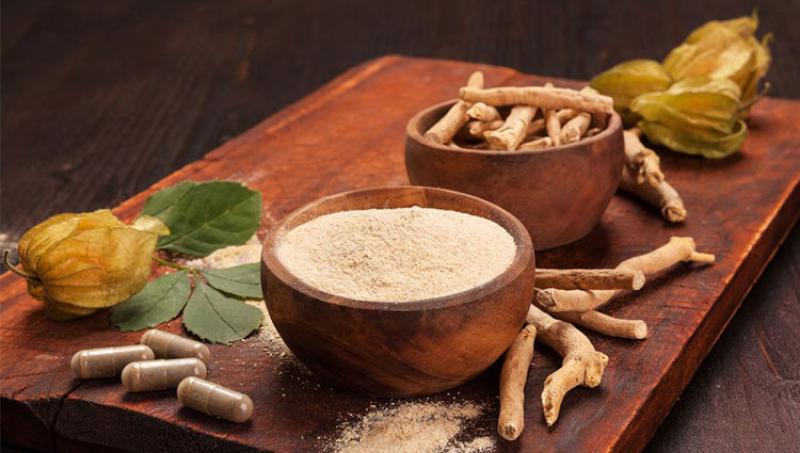Ashwagandha root is known as “Indian Ginseng”. In Ayurvedic medicine, it is considered an adaptogen that facilitates learning and memory.
Ashwagandha, one of the most vital herbs in Ayurvedic healing, has been used since ancient times for a wide variety of conditions but is most well known for its restorative benefits. In Sanskrit ashwagandha means “the smell of a horse,” indicating that the herb imparts the vigor and strength of a stallion, and it has traditionally been prescribed to help people strengthen their immune system after an illness. In fact, it’s frequently referred to as “Indian ginseng” because of its rejuvenating properties (although botanically, ginseng and ashwagandha are unrelated). In addition, ashwagandha is also used to enhance sexual potency for both men and women.
Belonging to the same family as the tomato, ashwagandha (or Withania somnifera in Latin) is a plump shrub with oval leaves and yellow flowers. It bears red fruit about the size of a raisin. The herb is native to the dry regions of India, northern Africa, and the Middle East, but today is also grown in more mild climates.
Ashwagandha contains many useful medicinal chemicals, including withanolides, (steroidal lactones), alkaloids, fatty acids, amino acids, and a variety of sugars. While the leaves and fruit have valuable therapeutic properties, the root of the ashwagandha plant is the part most commonly used in Ayurvedic medicines.
Kottakkal Ayurveda is a center for Ayurvedic massage, treatment, healing, herbal medicine, and lifestyle practices. Our team of dedicated Ayurveda practitioners, trained in the art of Ayurveda are here to support your transformation and wellbeing. Kottakkal Ayurvedic Treatment Centre is the premier provider of Ayurvedic services in Dubai (Deira, Satwa), Ajman and we’re excited to share these restorative techniques with you.
The healing benefits of ashwagandha can be summarized below:
• confers immune system protection
• combats the effects of stress
• improves learning, memory, and reaction time
• reduces anxiety and depression without causing drowsiness
• stabilizes blood sugar
• lowers cholesterol
• reduces brain-cell degeneration
• contains anti-malarial properties
• offers anti-inflammatory benefits
Ashwagandha in particular is known for its ability to calm, and some research indicates this herb can be used to promote sleep. Ashwagandha has also been shown to ease anxiety or restlessness, as well as to reduce the symptoms of drug withdrawal. Its ability to stabilize moods and encourage adrenal recovery is highly valued by many herbalists.
But the benefits of ashwagandha extend far beyond mood. In India, it is also used to help older patients with mental agility, cognitive ability, and memory. It is also known for its ability to fight off cold and cough symptoms. Preliminary studies give researchers reason to feel that ashwagandha also has the potential ability to decrease cancer cells without adversely affecting healthy cells.
Ashwagandha is also considered by many to be an anti-aging supplement, and it traditionally was known for its ability to provide nourishment to bones and muscles.
Ashwagandha Uses & Effectiveness
Ashwagandha has a wide range of health benefits, including its ability to fight against cancer and diabetes, as well as reduce inflammation, arthritis, asthma, hypertension, stress, and rheumatism. Furthermore, it boosts the supply of antioxidants and regulates the immune system.
• arthritis
• constipation
• insomnia
• skin conditions
• stress
• gastrointestinal issues
• diabetes
• nervous breakdowns
• fevers
• snake bites
• memory loss
• The leaves, seeds, and even fruit have all been used in different ways for various treatments.
 Ajman:052 6474941
Ajman:052 6474941  Dubai 055 3699446
Dubai 055 3699446 Satwa +971 55 610 3056
Satwa +971 55 610 3056 Sharjah +971 50 6545235
Sharjah +971 50 6545235 


